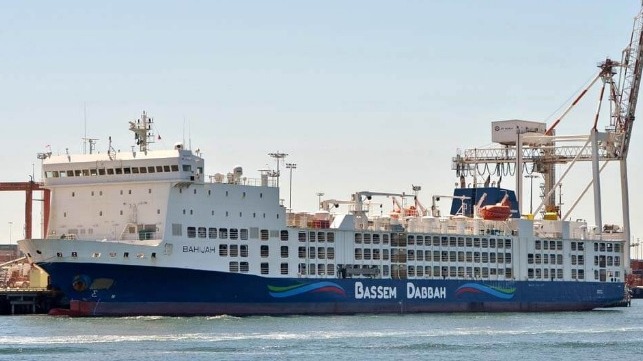Livestock Begin “Cruise” Around Africa as Carrier Diverts From Red Sea

Many vessels have diverted from planned transits for the Red Sea, but news that a loaded livestock carrier is changing course is raising concerns for the health and welfare of thousands of animals aboard the carrier Bahijah. Two weeks into a trip from Australia to Jordan, the Australian government confirmed that the vessel diverted saying that the exporter has a range of contingency options available.
Built in 2010, the livestock carrier Bahijah (7,900 dwt) is sailing under the flag of the Marshall Islands and is managed by a company in Croatia. It has a total of seven decks, four enclosed and three open, for the carriage of up to approximately 8,000 head of livestock and operates with a crew of 35. The vessel has been involved in past incidents, some when she was operating as the Ocean Outback for another company and experienced mechanical failures. Live export is a controversial trade that animal rights groups have long sought to ban.
Ship tracking indicates that Bahijah left Fremantle port for Aqaba, Jordan on January 5, after loading mostly sheep as well as some cattle. After 11 days, on January 16, the ship elected to change course away from the route to the Red Sea. This might in part be due to the ship having previously transported animals to Israel. Some reports indicate that the Bahijah is now heading to South Africa due to the worsening security situation in the Red Sea. The last signal on its AIS says “waiting orders.”
In a statement released on January 19, the Australian Department of Agriculture, Fisheries and Forestry (DAFF) said it is monitoring the passage of the vessel with the health and welfare of the animals on board being a top priority. Though the department did not disclose the number of livestock onboard, it stated that appropriate measures were undertaken before the ship left Australia aimed at guaranteeing the health and welfare of the animals.
The DAFF said that when the carrier departed Fremantle, it was satisfied that the arrangements for the transport of the livestock were appropriate to ensure their health and welfare. This ship is required to have a registered veterinarian and an accredited stockperson on board accompanying the consignment to attend to the health and welfare of the livestock.
As a condition of departure, the exporter was required to lodge contingency arrangements should the vessel not be able to reach the proposed destination in the Middle East. Among the contingency measures taken, DAFF reports the exporter loaded additional fodder and veterinary supplies above those required by Australian Standards for the Export of Livestock for the proposed voyage. However, the department did not mention how long the supplies would last.
“The department is monitoring the consignment closely and no significant animal health or welfare concerns have been reported at this time,” DAFF noted.
The exporter will be required to submit its contingency plan to DAFF, which they said would be reviewed by the department. They said they would consider future consignments on a case-by-case basis.
Animal rights groups are raising concern saying that the trip is stressful which would be compounded by a lengthy rerouting around Africa. They are calling on Australian exporters to voluntarily suspend shipments to destinations that are in or near regional conflicts.
Top photo of Bahijah in Fremantle in 2018 by Bahnfrend (CC BY-SA 4.0 DEED)
No comments:
Post a Comment